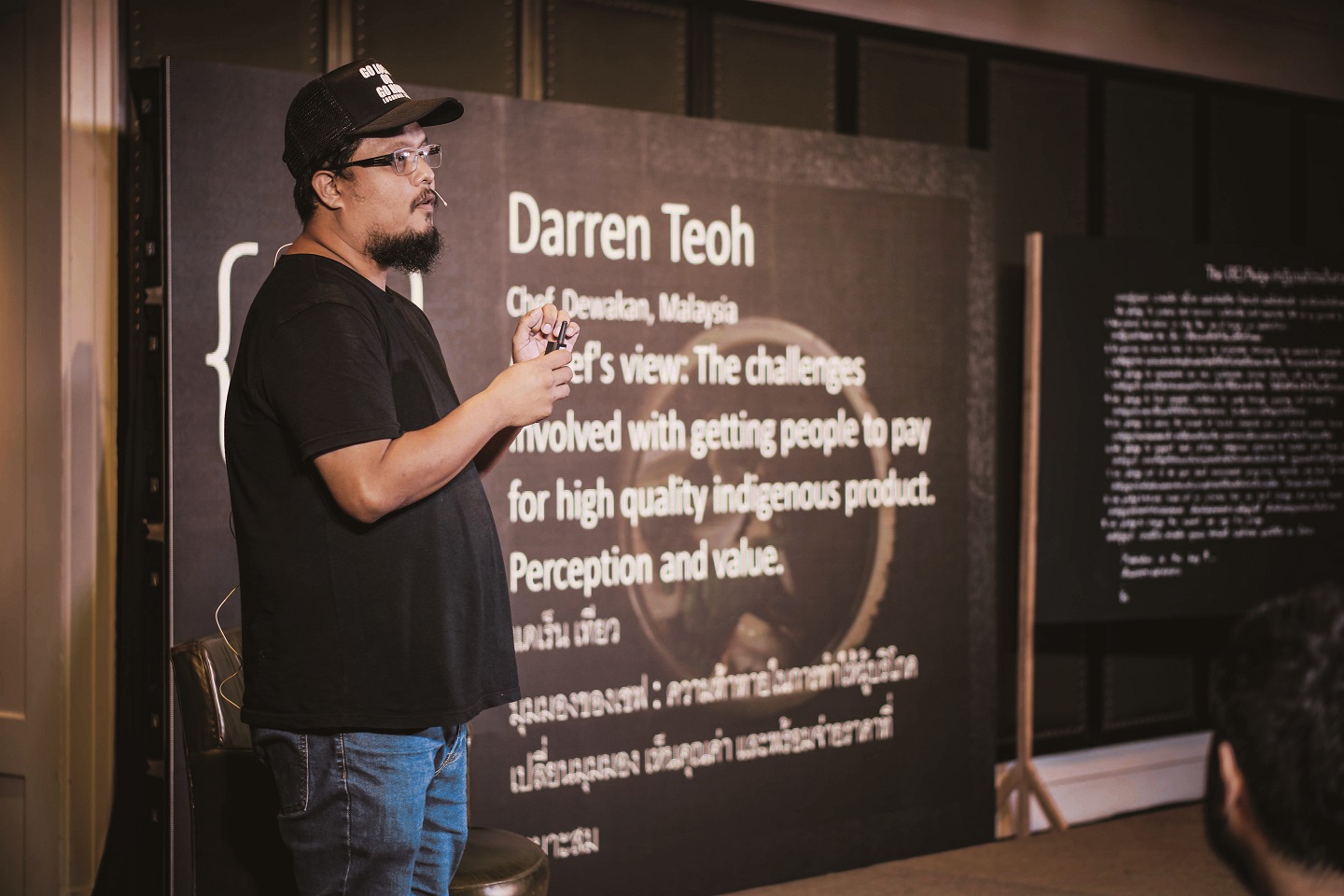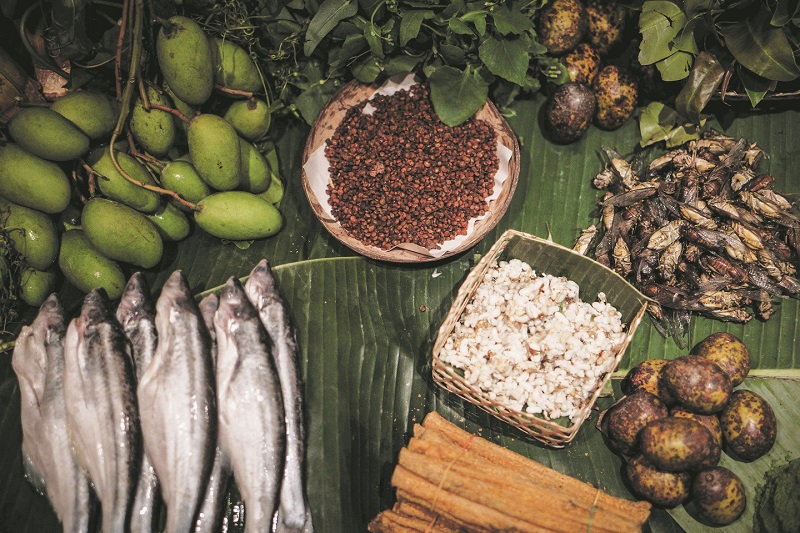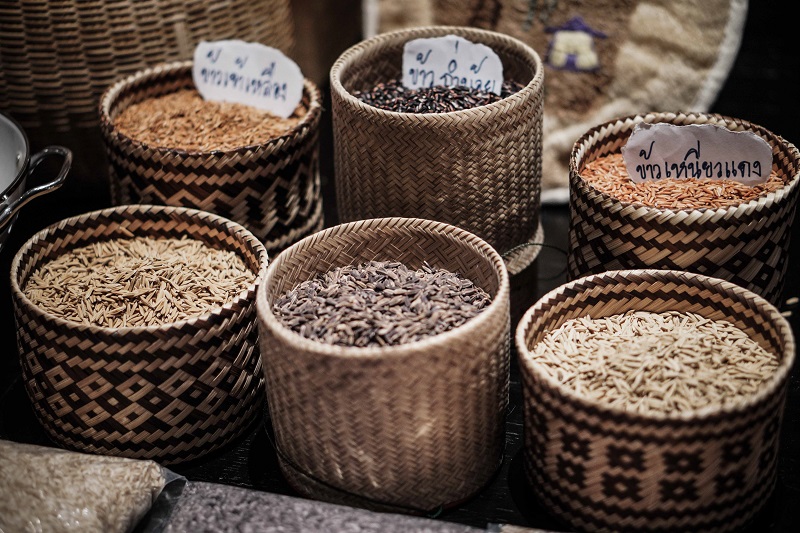
Chef Darren Teoh speaking at {Re} Food Forum in Bangkok. (Photo: Dewakan Restaurant)
In an era of camera cuisine — a term coined by Pete Wells in The New York Times to describe the culture of eating with our eyes first — we have distracted ourselves from the ugliness the food industry also creates, a byproduct of meeting the demands of a society that is increasingly more concerned about the prettiness of a plate over where the food on it comes from.
Every good thing has to start somewhere, akin to turning small talk into smart conversation. I was invited to speak at {Re} Food Forum in Bangkok, held on March 19 and 20, about the challenges of getting people to pay for high quality, indigenous ingredients. {Re} was a two-day forum held to create awareness of how to consume food responsibly, from food production to sustainable farming techniques, to packaging, waste and the use of indigenous ingredients. It was a space and time for a collaboration of minds, bringing together chefs — including Magnus Nilsson and Will Goldfarb — and farmers, fishermen, restaurateurs and scientists to initiate a discussion on the future of food in Asia.
If you remove all of the buzzwords that surround sustainability, you will find very noble, very unselfish notions of passionate people who care and who do little, small-scale things in the middle of nowhere that do not always look like they are going to catalytically change the world. Sometimes, it is one person trying to make ends meet and trying to do it in a meaningful way. Those were the people who had the heaviest things to say at the forum.

In 2016, Malaysians spent RM42 billion on food imports. At the same time, they threw away 15,000 tonnes of food every day, most of which ended up in a landfill or illegally dumped along the roadside or into rivers.
Although discussions such as the ones at {Re} are important, it would be a huge waste if all we do is pat ourselves on the back, pleased with our little efforts. Our duty is larger, the problems far more complex.
Consider the fishermen. How would you convince them to abolish practices that harm the ecosystem with their trawlers when they have to worry about putting their children through school, or contend with authorities that impose sometimes unwarranted restrictions on their nets or the speed of their boats?
How do you tell a farmer, “Please make sure that everything is biodynamic, but I will only buy your vegetables if they are pretty and only at this price”? Unless we are able to address the issues of lack, and act to correct them, I am afraid that we will continue to consume our world to the last crumb.
We should now ask ourselves, what do we really value?
In Malaysia, it is interesting to see how worth is attached to value. There is a certain myopia when considering the worth of a meal. Often, traditionally luxury ingredients dictate the price of popular cuisine. Truffles in and out of season — these days rarely even from France — substituted with cheaper and inferior alternatives provide an excuse for an increase in the price of a meal, which we lap up. Do we know why they are held in such esteem?

How have we come to this? Within our jungles and seas we are blessed with a biodiversity of animal and plant life that made our diets richer and more varied not many lifetimes ago. The old wisdom of using plants within our reach not only held culinary value but also kept us healthier. We have forgotten the value and the worth of what we have on our doorstep.
At Dewakan, we have found that a meal becomes far more enjoyable when we are able to share the knowledge of what we are learning with our guests. Malaysians especially are excited to hear that Sentul was named after a fruit, and what more to have the chance to eat it. It’s then that they see the value in our humble fruit and are glad to be a part of this knowledge. It isn’t about how loud you are speaking, it’s about who is listening.
I do believe there will be a shift to a more sustainable food future in the coming years in Malaysia and Southeast Asia. It’s happening in different pockets, and I think it has always been happening — more people are concerned about what they put in their mouths and they want to be active in the production of that as well. The conversation about food waste, farming, and indigenous ingredients, especially focused on Asia, is a conversation we should all be having, and constantly. I don’t have all the answers, but as Dylan Jones, the co-organiser of {Re} and chef at the Thai restaurant Bo.lan, says, “The food system, while part of the problem, can also be part of the solution.”
Academic, chef and author Darren Teoh heads the culinary team and kitchen at Dewakan Restaurant. This article first appeared on Apr 23, 2018 in The Edge Malaysia.


